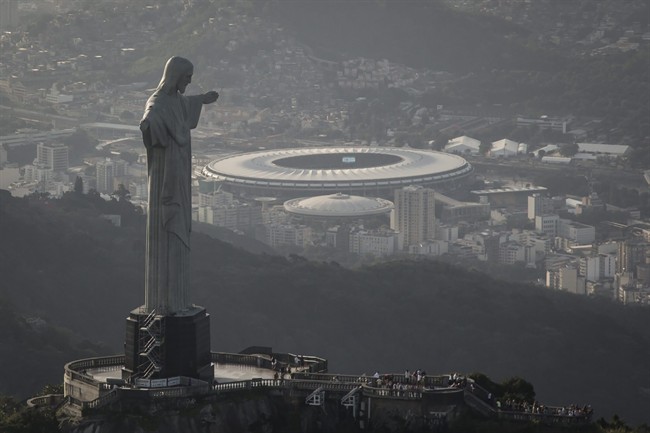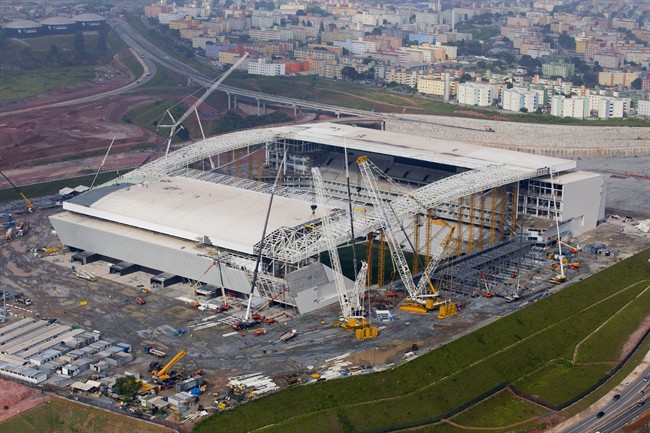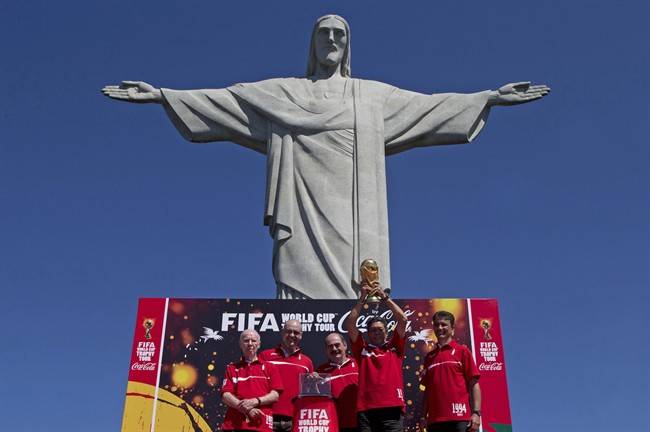WATCH: Football fans crowded around screens large and small across Rio on Thursday evening as the host nation Brazil faced Croatia in the opening match of the FIFA World Cup.

At one point or another in the days leading up to Thursday’s World Cup opener, transit systems and airports in Rio and Sao Paulo have either been choked with traffic congestion amid work stoppages or threatened with it.
Welcome to Brazil. Travellers still end up getting where they have to be (albeit later than intended) in spite of the striking transit workers in Sao Paulo and a partial job walk-off at Rio’s Galeão International Airport.
“It’s certainly a different culture than it is here—it’s organized chaos every day,” Gabor Forgacs, an associate professor at the Ted Rogers School of Management at Toronto’s Ryerson University said.
The wave of labour disputes in the lead up to the World Cup “is a little more than the usual organized chaos,” admits Forgacs, an expert in the Brazilian tourism industry.
But in soccer-mad Brazil, where so much is on the line for a government and local organizers eager to put their best foot forward – or save face – disgruntled workers are seizing the moment while they can.
The strikers, who have “legitimate issues,” are “taking this opportunity, when governments and organizers are under tremendous pressure, to further their causes,” Forgacs said. “They’re opportunistic.”
The brinkmanship has been effective.
Brazil’s federal police force negotiated a double-digit pay increase last week, while transit workers in Sao Paulo and Rio have won similar pay increases. Airport unions are now demanding their own raises, which they’ll likely get.
“Things more or less fall in place,” Forgacs said. But not without some fireworks first.
So it seems FIFA, soccer’s Zurich-based organizing body, can get Brazil to change its laws, but it cannot force a change in culture.
READ MORE: Beer back on menu in Brazil stadiums as controversial ban lifts
WATCH: The head of Rio State’s Project Management Office, Jose Candido Muricy, said Brazil’s second largest city is prepared for potential strikes during the World Cup.
And as the 2014 World Cup is about to officially start, there are still fireworks going off in the streets of Sao Paulo surrounding the city’s gleaming new 68,000-seat stadium.
Alongside labour disruptions, Brazilian activists have threatened to disrupt the tournament to protest the estimated $3.4 billion Brazil has spent on the tournament in new facilities that sit a short distance from the favelas, or shantytowns, where tens of thousands reside in poverty.
More than 300 demonstrators gathered along a main highway leading to the new Corinthians stadium. Some in the crowd tried to block traffic, but police repeatedly pushed them back, firing canisters of tear gas and using stun grenades.
READ MORE: Worker’s death, incomplete stadium mar lead-up to World Cup
“I’m totally against the Cup,” said protester Tameres Mota, a university student at the demonstration. “We’re in a country where the money doesn’t go to the community, and meanwhile we see all these millions spent on stadiums.”
The demonstrations in recent months have paled in comparison to those last year, when a million people took to the streets on a single night airing laments including the sorry state of Brazil’s public services despite the heavy tax burden its citizens endure.
Those protests were largely spontaneous and no single group organized them.
That’s now changed, said David Fleischer, a political scientist at the University of Brasilia. He said the recent protests have shrunk, because they are “very specific in their aims, so they are quite easy for the police to control.”
Because the recent protests have been organized by established groups, there are leaders with whom the government can negotiate. For instance, Fleischer said, in the past week the federal government convinced a large activist group of homeless workers to not demonstrate during the Cup.
“But we should understand, this isn’t too far from their everyday way of doing things.”
GALLERY: Is Brazil ready to host the World Cup?
–With files from Associated Press






























Comments